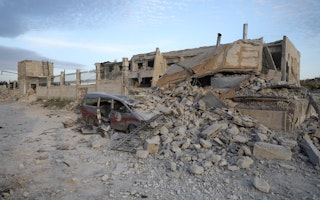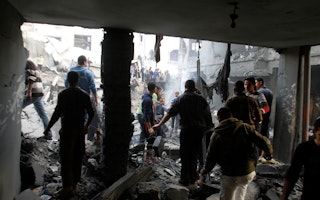Filmmakers in Syria Humanize a Conflict Overwhelmed by Media Images
By Ali Atassi

Photographs and videos were at the heart of the 2011 Syrian uprising. After decades of state control over imagery depicting Syrian society, citizens seized the opportunity to create such images on their own. They took to the streets armed with camera phones, uploading countless photos and videos to show the world what was happening in their country. Never before had such massive numbers of Syrians created and distributed images of the senseless violence, destruction, and death enveloping their society.
Ever since, international media have broadcast these graphic depictions. But little attention has been paid to the ordinary people living amid the violence and chaos. As a result, five years into the war, many around the world feel overwhelmed and disconnected from the sheer magnitude of the conflict.
So Bidayyat, an audiovisual arts organization that has supported citizen journalists and documentary filmmakers since 2012, has posed a challenge to a young generation of aspiring documentary filmmakers: how do you tell the story of “ordinary people” who silently struggle to survive a war?
Bidayyat gives grants to first-time Syrian documentarians and experimental film projects. We provide access to training, filming equipment, and other forms of support. Even under very difficult circumstances, we’ve carried out trainings inside Syria. When that’s proved impossible, we’ve resorted to the internet.
The film Siege was the outcome of a Skype workshop we conducted with 12 young people trapped in the onslaught of the Yarmouk Camp for Palestinians. The government besieged the Damascus camp in 2013, ransacking the shelters of the remaining residents, who had already been living in complete deprivation. Afterwards, hundreds of residents starved to death; others were reduced to eating grass to survive.

The four-part film is an intimate reflection on how the siege changed the lives of the residents. During the four months it took to make Siege, one filmmaker lost his father to a sniper, another was almost kidnapped, and a third was killed during an ISIS attack on the camp.
We encourage our grantees to make films that reflect their lives in Syria or in countries where they have sought refuge. To date, Bidayyat has trained over 100 emerging filmmakers and citizen-journalists, and supported more than 30 feature films and 50 short films. Many have been screened at international festivals such as the Berlinale, and received worldwide recognition and awards. Our Terrible Country was awarded the Grand Prix at Marseille’s International Film Festival, and is one of the first films to look at the impact ISIS has had on the lives of residents in eastern Syria.
Together with new Syrian filmmakers, we hope to shed light on the complexity and richness of Syrian society through documentary cinema that interrogates reality as much as it records it. We are convinced that by fostering a new generation of talents and an artistic Syrian documentary cinema and audiovisual arts scene, we are contributing to the reemergence of a more tolerant and open society in Syria.
Bidayyat is a grantee of the Open Society Foundations.
Ali Atassi is a filmmaker and director at Bidayyat.


